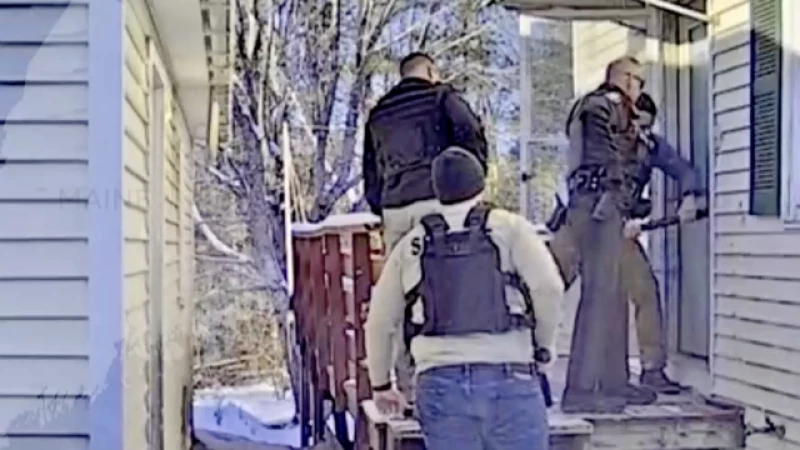Maine's Illicit Marijuana Trade
Maine has become a hotspot for the underground marijuana trade, with potentially hundreds of unlicensed grow houses operating in the state, as revealed by a recent investigation by CBS News.
This trend is not unique to Maine but is part of a larger pattern seen across the country. Former DEA chief of operations, Raymond Donovan, highlighted the emergence of thousands of illegal marijuana farms in states like Oklahoma, California, and Colorado.
Donovan pointed out that Maine's geographical location makes it an ideal spot for discreet cannabis cultivation, given its proximity to major distribution markets in Boston and New York.
One significant bust occurred in December when law enforcement in Maine raided a home in Machias, a rural town on the southeastern coast. The operation uncovered a large facility housing over 2,600 plants and 100 pounds of processed marijuana, marking one of the largest indoor marijuana grows Chief of Police Keith Mercier had ever encountered.
The successful raid was a collaborative effort involving multiple agencies, including the DEA, FBI, Homeland Security, the Office of Cannabis Policy, Maine Drug Enforcement Agency, and the Washington County Sheriff's Department.
"The issue at hand is widespread," Mercier pointed out. "Our data indicates that there are currently over 200 facilities in operation."
Law enforcement in Maine has carried out search warrants at a minimum of 34 properties connected to illegal marijuana activities since last June, with ongoing investigations.
One of the most surprising aspects of the rise in illicit cultivation in remote areas of Maine is the alleged backers of these operations.
"International Chinese criminal networks are believed to be the driving force behind some of the largest illegal marijuana trafficking organizations we have encountered so far," Donovan revealed.
In February, 50 members of the U.S. Congress penned a letter to Attorney General Merrick Garland seeking clarity on China's involvement in the illicit marijuana trade across the country.
Donovan emphasized that a key indicator of an illegal marijuana operation is its unusually high electricity consumption, a fact that Maine native Steve Robinson, editor of the Maine Wire, has been monitoring. Robinson has compiled a database of suspected illegal cannabis growers throughout the state.
"The consumption of electricity in these places is enormous," Mercier informed CBS News. "To support such a high energy demand, it is necessary to upgrade the electrical infrastructure significantly. We are talking about specialized electrical equipment that is quite rare and difficult to find, especially in the state of Maine."
Mercier mentioned that he used an article by Robinson as a reference to know what to investigate before carrying out the search warrant at the Machias property.
"Once we obtained the power records from the utility company, it was quite challenging to justify why anyone would require such a massive amount of electricity," he explained.
According to Mercier, the operation in Machias was utilizing four to five times more power than a typical household. Suspicious signs included closed windows, strong odors reported by neighbors, and suspicious van traffic in and out of the property.
During the operation, three individuals were arrested and charged with illegal cultivation. Among the items found were a Malaysian passport, a Chinese passport, and a Brooklyn driver's license.
Donovan informed CBS News that some individuals employed in marijuana cultivation facilities across the country are Chinese nationals who are victims of labor exploitation.
"They are lured here with the promise of legitimate work," he stated. "However, they are often held against their will in these locations and forced to oversee the cultivation of marijuana plants."
"They were being paid $1,000 a month to work 24/7," Mercier said. "I wasn't left under the impression that any of these gentlemen were in charge of anything. They were just strictly there to maintain the product."
Some of the same criminal groups behind illicit marijuana participate in a far deadlier drug trade, according to Donovan and other law enforcement sources. Donovan said the DEA first connected Chinese organized crime to these illegal weed cultivators by following the fentanyl supply chain.
"We quickly realized that money from selling fentanyl on the streets was going back to Chinese money brokers in Brooklyn and in Queens," he said. "We started investigating many of these brokers [and] observed that they were also trafficking in marijuana."
Marijuana remains illegal under federal law, but a majority of Americans now live in states where it's legal. There is a robust market for illicit marijuana — state regulations allow the sale of marijuana, but demand outstrips supply, opening a market for illegal growers.
Donovan fears that less prosecution will encourage organized crime groups trafficking marijuana to infiltrate sparsely populated states.
"If you have a place like Maine where marijuana is legal, there is less scrutiny on marijuana" he said. "It's a recipe for disaster in the sense that they're going to continue to go to these places and cultivate."







